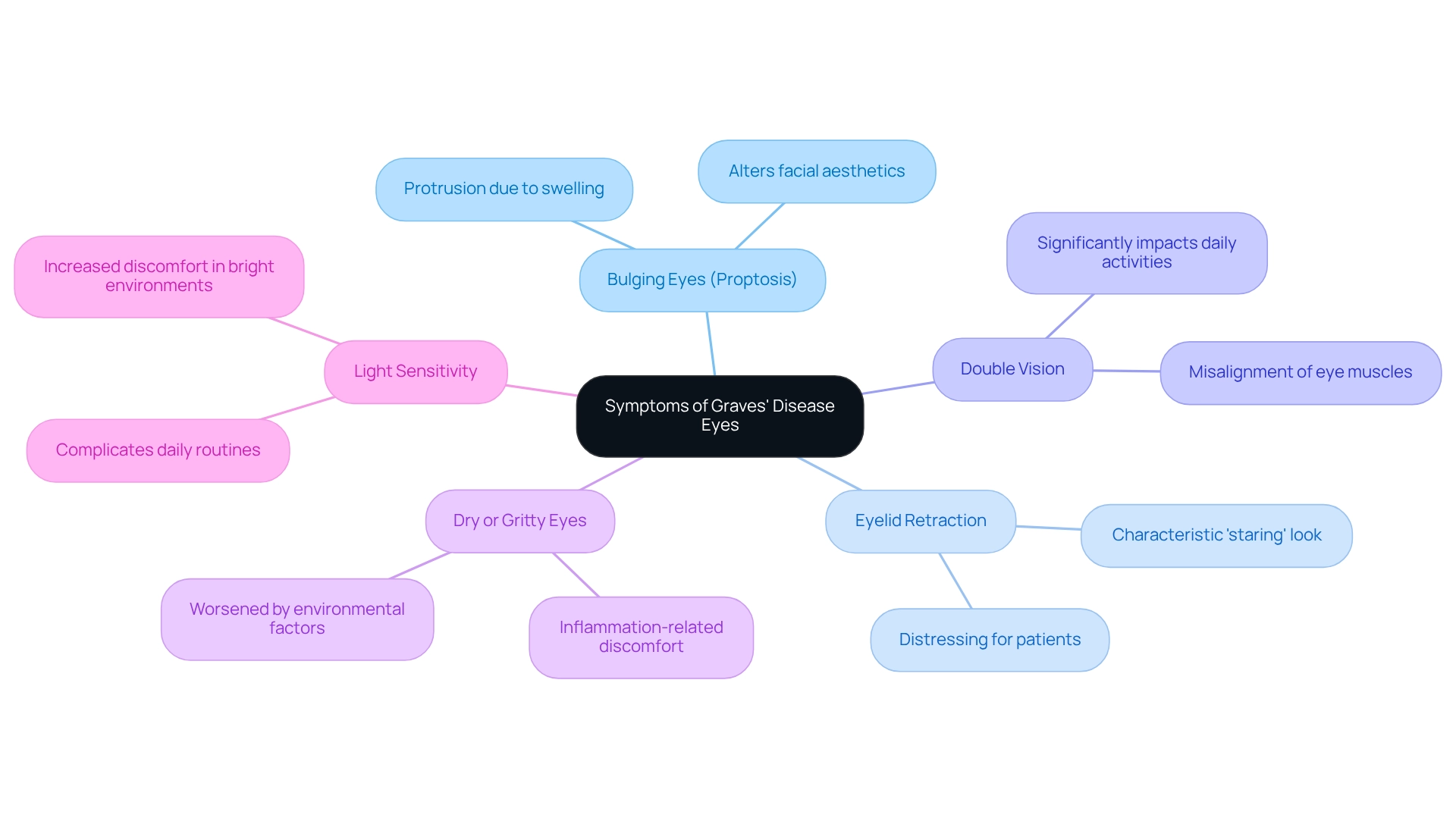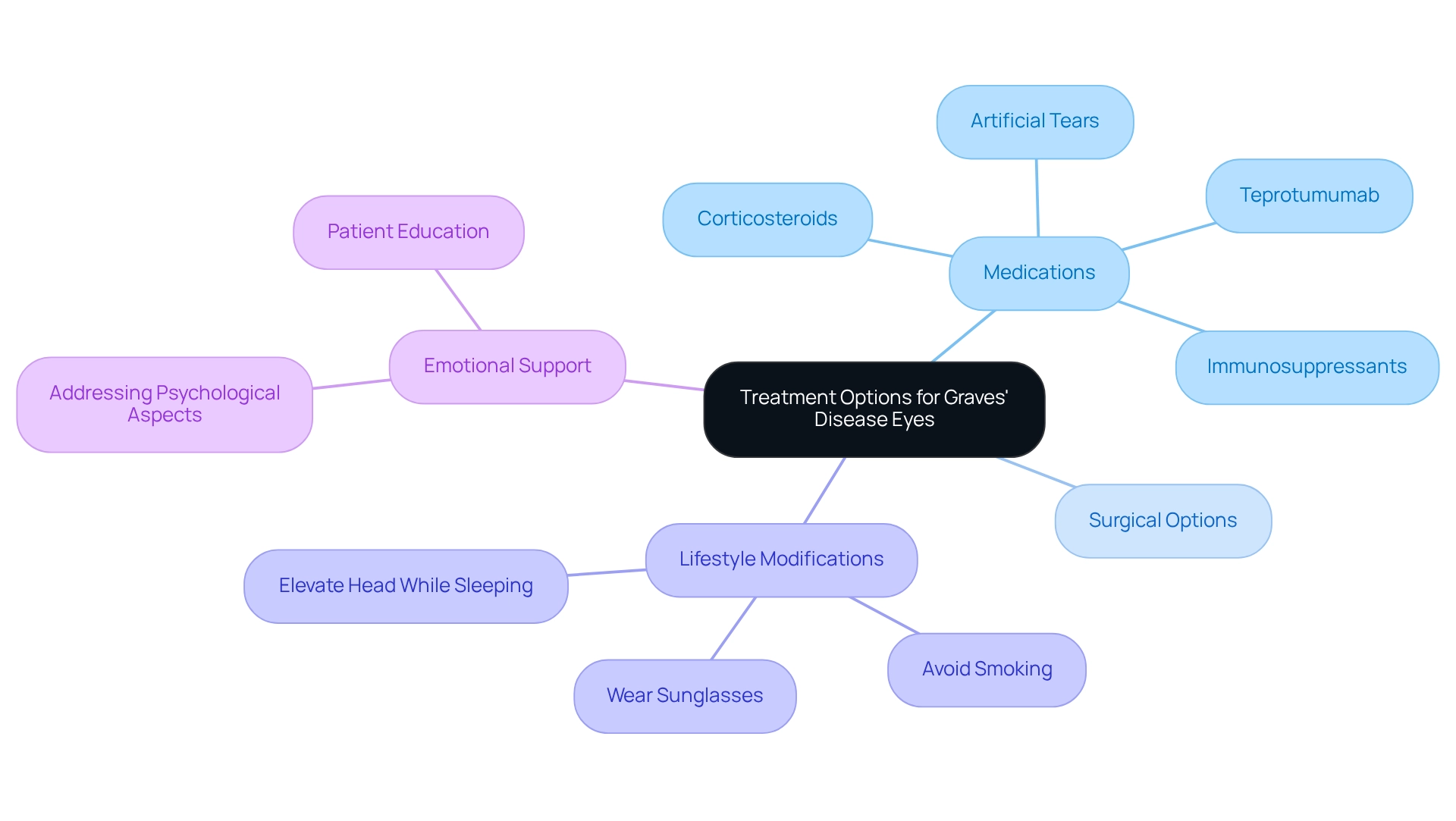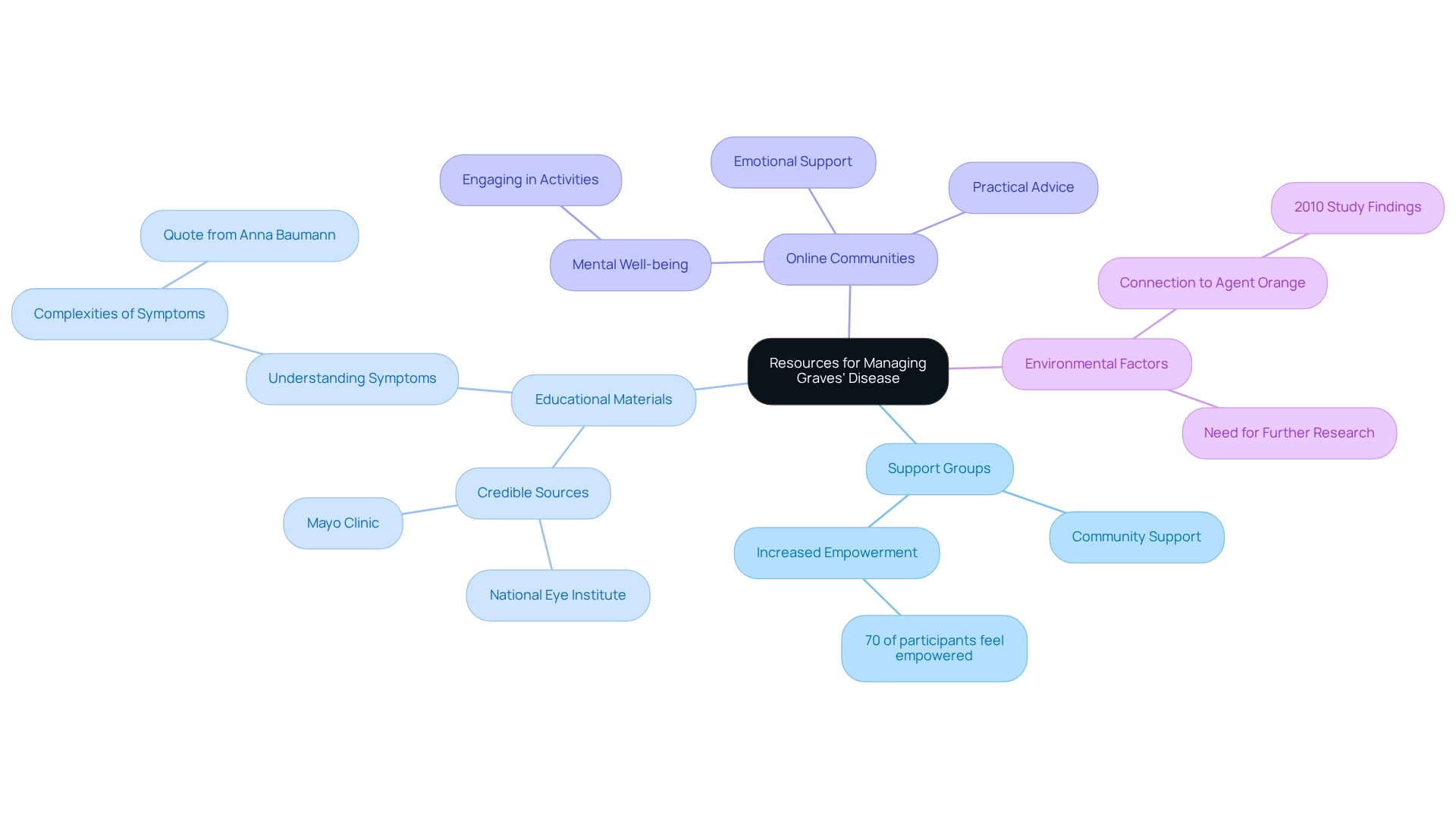Posted by: Northwest Eye in General on May 23, 2025
Overview
Graves’ disease can have a profound effect on your eye health, leading to symptoms such as bulging eyes, eyelid retraction, double vision, and dry or gritty eyes. Collectively, these are known as thyroid eye disease (TED). We understand that dealing with these symptoms can be overwhelming, but early diagnosis and personalized treatment options are available to help you manage them effectively.
It’s important to know that there are medications and lifestyle changes that can enhance your quality of life. We are here to help you through this process, ensuring that you receive the support and care you need. Remember, you are not alone in this journey, and taking action now can lead to a more comfortable future.
Introduction
In the realm of autoimmune disorders, Graves’ disease stands out not only for its impact on the thyroid but also for its significant implications for eye health. We understand that facing this condition can be daunting, especially as it often leads to thyroid eye disease (TED). This disorder can manifest in troubling symptoms, from bulging eyes to double vision, altering not just vision but also the quality of life for those affected.
With an annual incidence that underscores its prevalence, awareness and understanding of Graves’ disease are crucial. It’s common to feel overwhelmed by the varying treatment approaches across the globe. As the medical community continues to unravel the complexities of this condition, we want to emphasize that timely diagnosis and personalized care are essential in preventing complications and enhancing patient outcomes.
This article delves into the symptoms, treatment options, and support resources available for managing the ocular effects of Graves’ disease, highlighting the importance of proactive health management. We are here to help you through this process.
Define Graves’ Disease and Its Impact on Eye Health
This condition is an autoimmune disorder that primarily affects the thyroid gland, resulting in hyperthyroidism. It can significantly impact eye health, resulting in Graves disease eyes, which is also referred to as thyroid eye disease (TED). In this disorder, the immune system mistakenly targets the tissues around the orbs, causing inflammation and swelling. We understand that experiencing symptoms like proptosis, or bulging orbs, eyelid retraction, and double vision can be concerning. Additionally, blurred vision may occur, which can signal underlying issues such as cataracts, diabetic retinopathy, or dry eyes that require professional evaluation. The yearly occurrence of this condition varies from 30 to 50 cases per 100,000 people, emphasizing its commonality and the necessity for awareness, especially among those worried about their eye health.
Recent studies suggest that the management of thyroid disorders differs worldwide, with notable variations in treatment choices and diagnostic methods among endocrinologists in 85 nations. This underscores the evolving clinical practices in addressing the condition and its ocular manifestations. For instance, findings from a survey titled “Global Trends in Disease Management” reveal diverse approaches to treatment, emphasizing the importance of personalized care.
Comprehending the effect of Graves disease eyes on vision is essential for patients. We recognize that prompt diagnosis and action can avert complications related to Graves disease eyes, including sight loss. Expert views stress the significance of identifying early signs of Graves disease eyes and obtaining suitable care. As the field continues to progress, staying updated on the most recent studies and treatment alternatives is crucial for efficient management of this condition and its impacts on eye health. As one insightful quote states, “If nothing changes, nothing changes,” highlighting the necessity for proactive behavior in managing this condition.
At Northwest Eye, we are here to help you through this process. We are committed to providing comprehensive eye care solutions tailored to your needs. If you are facing signs associated with an autoimmune disorder or , we encourage you to arrange a meeting for a comprehensive assessment. Positive patient reviews further reflect Northwest Eye’s commitment to excellence and tailored solutions, reinforcing the importance of seeking specialized care.
Identify Symptoms of Graves’ Disease Eyes
Common symptoms of Graves’ disease that impact the eyes include:
- Bulging Eyes (Proptosis): This condition occurs when the eyes protrude due to swelling of the surrounding tissues, often leading to a noticeable change in appearance. We understand that this sign can be particularly distressing for patients, as it alters their facial aesthetics.
- Eyelid Retraction: It’s common to feel alarmed when eyelids retract more than usual, a condition often seen in , resulting in a characteristic ‘staring’ look. This can be distressing, especially when considering the overall effect of hyperthyroidism on everyday life.
- Double Vision: Swelling in graves disease eyes can affect , causing misalignment and resulting in double vision. We recognize that this can significantly impact daily activities, and comprehending this indicator is vital, particularly for individuals who might mistake it for other conditions.
- Dry or Gritty Eyes: Dry or gritty eyes can occur due to inflammation associated with Graves’ disease, leading to discomfort and irritation. We want you to be aware that this indication can be worsened by environmental factors, making it essential to be mindful of your surroundings. As highlighted by Northwest Eye, dry eyes can also signal other underlying conditions that require professional evaluation.
- Light Sensitivity: Individuals with Graves disease eyes may develop increased sensitivity to light due to inflammation, making it uncomfortable for them to be in bright environments. We understand that this can further complicate daily routines, particularly for those who are already managing other health conditions.
It is important to recognize that interpreting these signs can be difficult, particularly for women in their late 40s who may also face indicators related to perimenopause, as emphasized by Baumann. Timely identification of these signs is essential, as it can enable more efficient management and treatment alternatives, ultimately enhancing quality of life for those impacted. As John Maxwell wisely stated, “The secret to success is found in your daily routine,” emphasizing the importance of recognizing and addressing health issues promptly. If you are noticing any of these signs, we encourage you to schedule an appointment with a Northwest Eye doctor for a professional evaluation. We are here to help you through this process.

Explore Treatment Options for Graves’ Disease Eyes
Managing the eye symptoms associated with [Graves disease eyes](https://nweyeclinic.com/eye-conditions/refractive-error) can feel overwhelming, but there are various treatment options available to help you navigate this journey. We understand that addressing the symptoms associated with Graves disease eyes is crucial for your comfort and well-being.
Medications like corticosteroids are often prescribed to help reduce inflammation and swelling associated with Graves disease eyes. Additionally, immunosuppressants may be used to control the autoimmune response that contributes to the symptoms associated with Graves disease eyes. Artificial tears, which are over-the-counter lubricating eye drops, can help relieve dryness and irritation associated with Graves disease eyes, enhancing your comfort during this challenging time. In more severe cases of Graves disease eyes, surgical options may be necessary to correct double vision or relieve pressure on the optic nerve, ultimately leading to .
Teprotumumab (Tepezza) is an FDA-approved medication that specifically targets conditions related to Graves disease eyes. It has shown effectiveness in reducing bulging and improving overall symptoms. As noted by William C. Lloyd III, MD, FACS, “Fortunately, with the introduction of teprotumumab, patients have a new and effective treatment option, with more like it coming down the pipeline.” Recent updates continue to highlight its promise, with ongoing research into its long-term benefits.
- Lifestyle Modifications: We encourage you to consider adopting certain lifestyle changes, such as avoiding smoking, wearing sunglasses for eye protection, and elevating your head while sleeping to minimize swelling.
It’s important to know that 3–5% of patients with hyperthyroidism will develop severe ophthalmopathy associated with Graves disease eyes, which underscores the significance of these treatment options. Moreover, the emotional impact of Graves disease eyes can be considerable, making it essential to address both the physical and psychological aspects of care. By understanding these treatment options, you can work closely with your healthcare provider to create a personalized plan that meets your unique needs and enhances your quality of life. Remember, we are here to help you through this process.

Utilize Resources and Support for Managing Graves’ Disease
Patients with Graves’ disease have access to a variety of valuable resources and support systems that can significantly enhance their management of the condition:
- Support Groups: We understand that navigating this journey can be challenging. Organizations such as the Graves’ Disease & Thyroid Foundation provide essential community support, allowing individuals to share experiences and coping strategies. Studies indicate that patients involved in support groups report higher satisfaction with their management strategies, with statistics showing that 70% of participants felt more empowered in their health management.
- Educational Materials: It’s common to feel overwhelmed by information. Credible sources such as the National Eye Institute and Mayo Clinic offer extensive information on thyroid disease, including signs, treatments, and management strategies, empowering patients with knowledge. As Anna Baumann noted, “For my fellow Gravesters that are of a certain age, do you find it hard to decipher whether what you’re feeling is related to Perimenopause or Graves Disease?” This highlights the complexities faced by patients in understanding their symptoms. Healthcare providers should ensure that regular consultations with ophthalmologists and endocrinologists focus on monitoring and customizing treatment plans to individual needs, ensuring optimal care. We encourage you to prioritize these appointments as part of your health management.
- Online Communities: Engaging in online forums can foster emotional support and practical advice from peers facing similar challenges, creating a sense of belonging and understanding. Participating in pleasurable activities and physical activity can also enhance mental well-being for individuals facing Graves disease eyes, highlighting the significance of a comprehensive strategy for managing this condition.
- Environmental Factors: Understanding the potential connections between environmental factors and the autoimmune condition is essential. A study published in 2010 explored the connection between Graves’ disease and exposure to Agent Orange, highlighting the need for further research in this area.
Engaging with these resources not only empowers you to take an active role in your health management but also contributes to improved overall well-being. Remember, we are here to help you through this process.

Conclusion
Graves’ disease significantly affects not only thyroid function but also eye health. Symptoms such as bulging eyes, eyelid retraction, and double vision can profoundly impact a person’s quality of life. We understand that recognizing these symptoms early is crucial, as timely intervention can prevent further complications, including vision loss. The importance of personalized care and a proactive approach cannot be overstated, especially given the variations in treatment practices worldwide.
The treatment landscape for Graves’ disease has evolved to include a range of options. From medications and lifestyle modifications to surgical interventions and targeted therapies like Teprotumumab, each patient’s journey is unique. It’s common to feel overwhelmed, which highlights the necessity of collaboration with healthcare providers to tailor management strategies that address individual needs.
Support systems, including educational resources and community groups, play a vital role in empowering patients. By engaging with these resources, individuals can gain valuable insights and emotional support, fostering a sense of community among those navigating similar challenges.
Ultimately, understanding Graves’ disease and its ocular manifestations is key to effective management. With awareness, timely treatment, and support, patients can enhance their quality of life and mitigate the impact of this condition on their daily lives. Taking proactive steps today can lead to a brighter, healthier tomorrow for those affected by Graves’ disease.
Frequently Asked Questions
What is Graves disease and how does it affect the thyroid gland?
Graves disease is an autoimmune disorder that primarily affects the thyroid gland, leading to hyperthyroidism. It causes the immune system to mistakenly target tissues around the eyes, resulting in inflammation and swelling.
What are the symptoms associated with Graves disease eyes?
Symptoms include proptosis (bulging eyes), eyelid retraction, double vision, and blurred vision. Blurred vision may also indicate other underlying issues such as cataracts, diabetic retinopathy, or dry eyes.
How common is Graves disease?
The yearly occurrence of Graves disease varies from 30 to 50 cases per 100,000 people, highlighting its commonality and the need for awareness regarding eye health.
How do treatment and diagnostic methods for thyroid disorders vary worldwide?
Recent studies indicate that the management of thyroid disorders differs globally, with notable variations in treatment choices and diagnostic methods among endocrinologists in 85 countries, emphasizing the importance of personalized care.
Why is it important to understand the effects of Graves disease on vision?
Understanding the effects is crucial because prompt diagnosis and action can prevent complications, including sight loss. Early identification of symptoms and appropriate care are essential.
What should patients do if they experience symptoms related to Graves disease eyes?
Patients experiencing symptoms associated with an autoimmune disorder or other eye issues are encouraged to arrange a meeting for a comprehensive assessment to receive specialized care.
What is the commitment of Northwest Eye regarding eye care?
Northwest Eye is dedicated to providing comprehensive eye care solutions tailored to individual needs and emphasizes the importance of seeking specialized care, as reflected in positive patient reviews.






